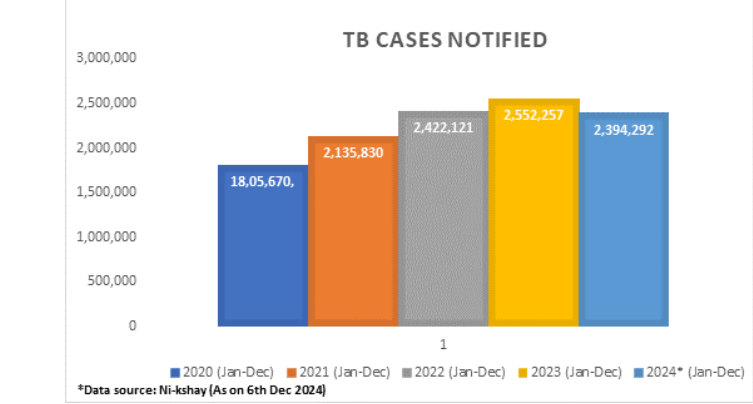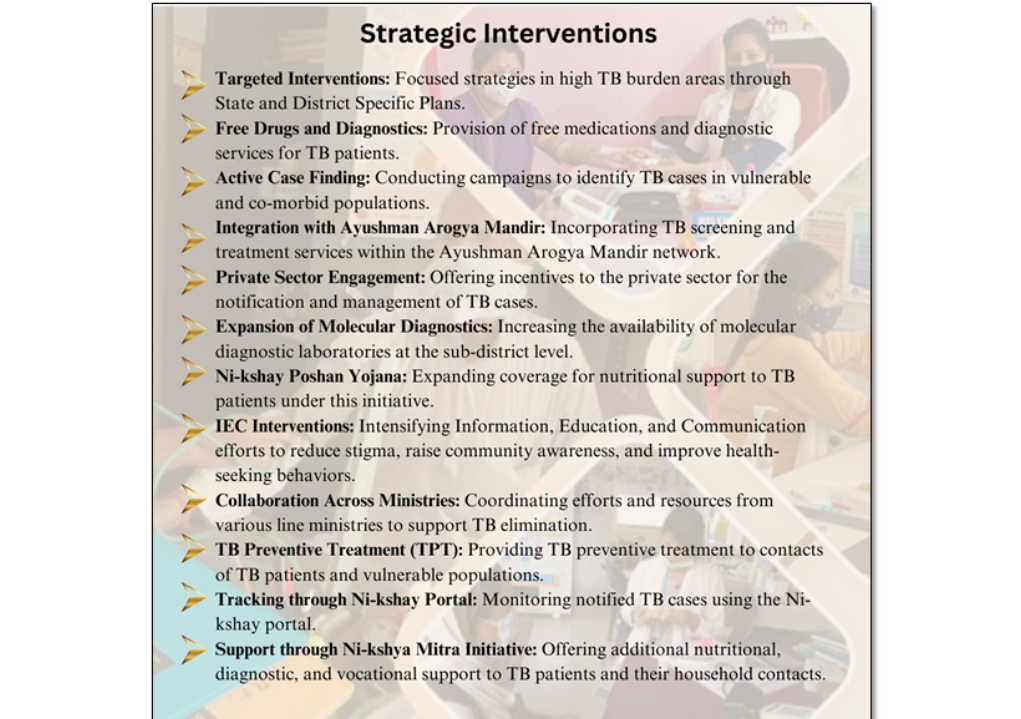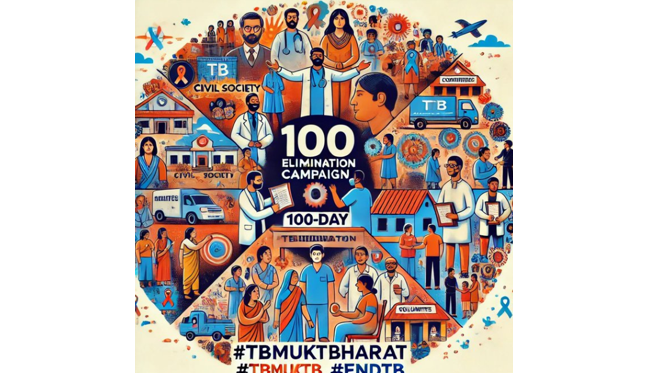On 7 December 2024, India will take a bold step towards eliminating tuberculosis (TB), a disease that continues to affect millions across the nation. The Union Minister of Health and Family Welfare, Jagat Prakash Nadda, will officially launch the ambitious 100-Day TB Elimination Campaign in Panchkula, Haryana. This campaign aims to accelerate the fight against TB by improving case detection, reducing diagnostic delays, and enhancing treatment outcomes, particularly for vulnerable populations. Spanning 347 districts across 33 states and union territories, the campaign represents a critical component of India’s strategy to eliminate TB and build a TB-free nation.
The National TB Elimination Programme (NTEP): A Vision for a TB-Free India
The 100-Day Campaign is a part of the broader framework of the National TB Elimination Programme (NTEP) under the aegis of the National Health Mission (NHM), which is aligned with the National Strategic Plan (NSP) for TB Elimination 2017–2025. The NSP focuses on reducing TB incidence, enhancing diagnostic and treatment capabilities, and addressing the socio-economic impact of the disease. This ambitious initiative reflects the vision set by Prime Minister Narendra Modi at the 2018 End TB Summit, where he pledged to achieve a TB-free India by 2025.
Significant progress has been made under NTEP to reduce TB in India. The TB incidence rate decreased by 17.7%, from 237 per 100,000 in 2015 to 195 per 100,000 in 2023. Similarly, TB-related deaths have declined by 21.4%, from 28 per lakh population in 2015 to 22 per lakh population in 2023. Over the past five years, there has been consistent progress in TB case notifications, as seen in the following data:

Post-COVID-19, India has intensified its efforts to eliminate TB through NTEP, which continues to be aligned with the NSP. In 2023, key achievements included conducting around 1.89 crore sputum smear tests and 68.3 lakh nucleic acid amplification tests, reflecting a commitment to expanding diagnostic access across healthcare levels.
In line with evolving medical research, NTEP introduced comprehensive care packages and decentralized TB services, which now include broader access to shorter oral regimens for drug-resistant TB (DR-TB) patients. The program emphasizes minimizing treatment delays and improving the quality of care, with particular attention to addressing co-existing health conditions like malnutrition, diabetes, HIV, and substance abuse through a differentiated care approach and encouraging early diagnosis. Preventive measures also remain central to the NTEP’s strategy, with a significant expansion in access to TB preventive treatment (TPT). This has led to an increase in the number of beneficiaries receiving TPT, including those on the shorter regimen, to approximately 15 lakh.
Recognizing the interplay between TB and other health conditions, the NTEP has launched initiatives to address issues like malnutrition, diabetes, HIV, and substance abuse. By collaborating with various ministries and departments, these efforts aim to provide more holistic support to TB patients, ultimately improving their treatment outcomes.
Enhancing Diagnostics and Treatment for High-Risk Populations
A major focus of the 100-Day TB Elimination Campaign will be the strengthening of diagnostics and treatment services, particularly for the most vulnerable groups. These include people living in remote and underserved areas, marginalized communities, and individuals with co-morbidities such as diabetes, HIV, and malnutrition. The campaign will target high-burden areas with specialized strategies designed to improve access to advanced diagnostics and reduce the delay in treatment initiation.
The campaign will leverage existing health infrastructure, including the extensive network of Ayushman Aarogya Mandirs, which have been instrumental in bringing TB services to the grassroots level. In addition, screening efforts will focus on high-risk groups, and specialized care packages will be rolled out for individuals facing additional health challenges.
The initiative will also expand nutritional support through the Ni-kshay Poshan Yojana, which provides financial aid to TB patients for better nutrition. Additionally, the government has integrated the social support initiative Pradhan Mantri TB Mukt Bharat Abhiyaan (PMTBMBA) to ensure that household contacts of TB patients receive comprehensive care and support.
Strategic Interventions
The National Tuberculosis Elimination Program (NTEP) is at the heart of a broader strategy to combat tuberculosis (TB) and address the disparities in TB outcomes across India. As part of this strategy, several key interventions are being made, including case detection improvements, diagnostic delays reduction, and enhanced treatment outcomes, especially for vulnerable communities. These efforts aim to strengthen the NTEP and ensure a more equitable and effective approach to eliminating TB across the nation, such as:
These efforts are expected to improve key performance indicators such as TB incidence, diagnostic coverage, and mortality rates, thus bringing India closer to its goal of eliminating TB.

Financial Support and Community Engagement: Empowering the Fight Against TB
India’s commitment to TB elimination goes beyond medical interventions. Through the Ni-kshay Poshan Yojana, the government has disbursed nearly Rs. 2,781 crores in direct benefit transfers to support 1 crore beneficiaries. Additionally, new initiatives will focus on incentivizing treatment supporters, including ASHA workers, TB champions (Vijetas), and family caregivers under the Ni-kshay SAATHI model. This support network ensures that patients receive continuous care, both in medical and emotional terms.
The launch of PMTBMBA in 2022 marked a turning point in the fight against TB by encouraging widespread community involvement. More than 1.5 lakh Ni-kshay Mitras (community supporters) have already joined the effort to help those affected by TB. Political leaders, government officials, and NGOs have also actively participated in awareness campaigns, reflecting the collective effort to end TB at the grassroots level.
India’s International Commitment to TB Elimination
India’s approach to eliminating TB is not just a national endeavor; it is also aligned with global goals. As a signatory to the United Nations Sustainable Development Goals (SDGs), India is committed to meeting the target of ending TB by 2025, five years ahead of the SDG deadline of 2030.
India’s commitment to TB elimination is also evident in its support for international declarations, such as the Gandhinagar Declaration, which was signed by health ministers of the WHO South-East Asia Region in August 2023. This regional pledge aims to sustain, accelerate, and innovate the fight against TB in the region by 2030.
The Road Ahead: Ending TB by 2025
The 100-Day TB Elimination Campaign marks an important milestone in India’s journey toward a TB-free nation. By enhancing diagnostics, treatment, and support services, particularly for high-risk groups, India is setting the stage for a comprehensive approach to end TB by 2025. With continued political will, community engagement, and international cooperation, the dream of a TB-Mukt Bharat—an India free from tuberculosis—is within reach.
The commitment to this cause reflects a broader vision of health equity, social justice, and sustainable development. As India takes decisive action in the fight against TB, it sets an example for the world, proving that through collaboration, innovation, and determination, global health challenges can be overcome.


